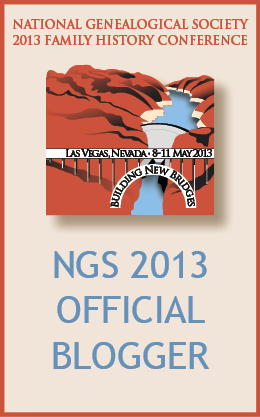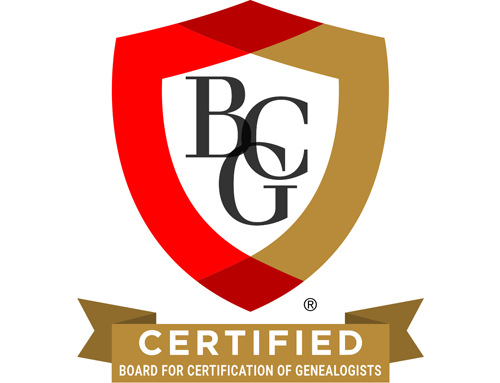BCG board members and local Board-certified genealogists often offer certification seminars at national and regional conferences. The seminar topics cover everything from considering why to apply to tips for the application process.
Several certification seminars are already on the calendar. They are free for conference attendees (after conference registration costs) and everyone – whether considering certification, already “on the clock,” or a Board-certified associate assembling a renewal portfolio – is welcome to come and learn more about the process.
At the Ohio Genealogical Society conference in Cincinnati on Thursday, 25 April 2013, Elissa Scalise Powell, CGSM, CGLSM, will conduct a “BCG Associate Gathering and Renewal Discussion.” Then at 3:30 pm she will give “Reasons & Tips for Becoming a Board-certified Genealogist.” Please join in the appropriate session!
At the National Genealogical Society’s 2013 annual conference in Las Vegas, Nevada, session T211 is marked as a double session, however you may come to one or the other or both. There David McDonald, CGSM, Elissa Scalise Powell, CGSM, CGLSM, and Warren Bittner, CGSM, will spend the time on reasons why board-certification might be appropriate, discussing application strategies and fielding questions from interested audience members.
Another opportunity to interact with board-certified speakers in a seminar is scheduled at 2:00 p.m., Thursday, 22 August 2013, in Fort Wayne, Indiana, at the annual conference of the Federation of Genealogical Societies, session T237. There David and Elissa will be joined by Jeanne Larzalere Bloom, CGSM, and Debbie Mieszala, CGSM.
Each team is sure to cover the issue of preparation. Here is what the syllabus says about that:
Education and experience are the two main components in preparing for certification. The goal is to acquire and practice the standards articulated in The BCG Genealogical Standards Manual.
The Board sets no formal educational requirement. Surveys of successful applicants show that most have availed themselves of structured learning opportunities well above the introductory level—attending institutes, conferences, and workshops or enrolling in online or distance-learning courses. Self-education, derived from analyzing case studies developed by board-certified persons and published in major peer-reviewed genealogical journals, is also helpful.
Experience comes in many forms. Successful applicants for certification are experienced in dealing with the full range of challenges genealogists face. They demonstrate sound, critical judgment when evaluating the work of others. They hone their ability to resolve research problems, develop expertise in specific areas, and strive for excellence in every regard. While it takes a number of years to acquire the education and experience needed for certification, the personal and professional rewards from certification are significant.[1]
[1] “Board for Certification of Genealogists’ Certification Seminar,” 2012 Family History Conference Syllabus: The Ohio River, Gateway to the Western Frontier, session T201 (Arlington, Virginia: National Genealogical Society, 2012): 116.


